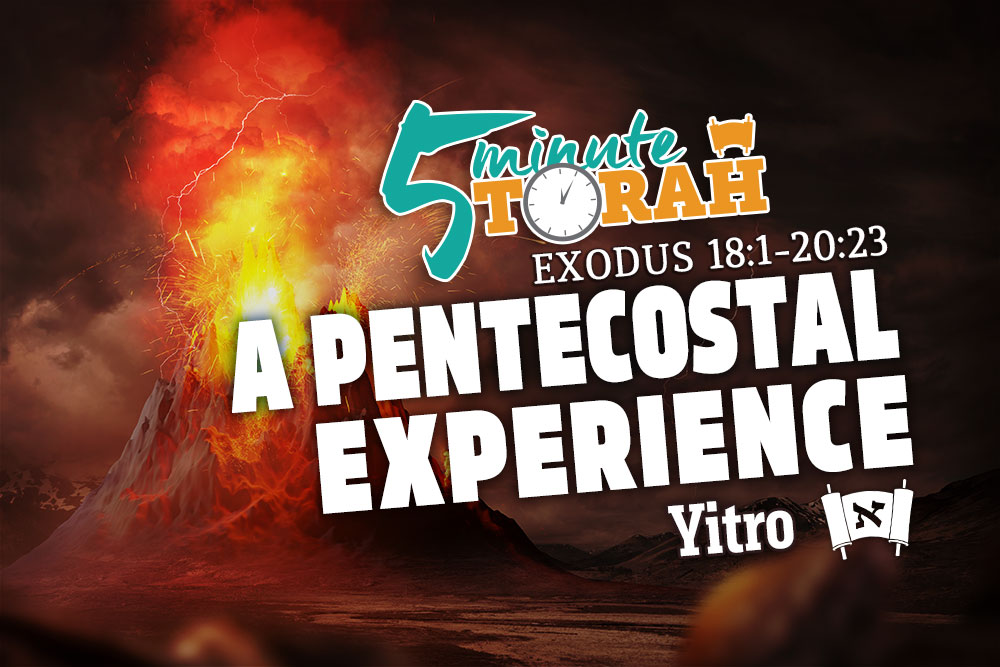A Pentecostal Experience
Series:

Parshat Yitro
(Exodus 18:1-20:23)
We are all familiar with what took place in Acts 2. After Yeshua’s resurrection he instructed his disciples to remain in Jerusalem so that they would be filled with the Ruach HaKodesh, the Holy Spirit (Acts 1:4–8). Here’s the account of how it happened:
When the day of Pentecost arrived, they were all together in one place. And suddenly there came from heaven a sound like a mighty rushing wind, and it filled the entire house where they were sitting. And divided tongues as of fire appeared to them and rested on each one of them. And they were all filled with the Holy Spirit and began to speak in other tongues as the Spirit gave them utterance. (Acts 2:1–4)
Yeshua’s disciples encountered the Spirit of Hashem in a powerful way that not only transformed their lives but also empowered them to boldly proclaim the good news of Yeshua’s coming Kingdom. But what does this event that happened during the lives of the Apostles have to do with our current Torah portion? Parashat Yitro records for us the giving of the Torah on Mount Sinai, particularly the “Big Ten” of the 613 commandments. It tells us how God revealed Himself to an entire nation at once:
Now when all the people saw the thunder and the flashes of lightning and the sound of the trumpet and the mountain smoking, the people were afraid and trembled, and they stood far off.” (Exodus 20:15[18])
There is a problem with this passage, however, that almost every commentator addresses. We are told that all the people “saw the thunder and the flashes of lightning.” It’s normal to hear thunder, but not normal to see thunder. And to compound the problem even further, the Hebrew doesn’t use the normal word for thunder. It uses haqolot, which means “the voices.” Literally, the people saw “the voices.” How do you see voices and what voices are we talking about? The Midrash understands this to mean that the voice of God came from the top of the fiery mountain (Deuteronomy 5:19[23]-20[24]) and went out to all the nations in all of the known languages of the world:
Rabbi Yochanan said, “The voice would go out and divide into seventy voices for the seventy languages, so that all the nations would hear. And each and every nation would hear in the language of the nation and their souls would depart. But Israel would hear and they were not injured.” (Shemot Rabbah 5:9)
Jewish tradition places this event at the festival of Shavuot, also known by its Greek name, Pentecost. God gave His Torah at Pentecost and His voice went forth in all the known languages of the world to proclaim His Kingship on earth. Essentially, this is what happened in the book of Acts as well. The Apostles would have associated this experience with the original Shavuot, confirming that God was doing something related to that first event. When all of Israel had gathered in Jerusalem to celebrate Shavuot (Pentecost), something incredible happened. God once again revealed Himself in a powerful way. This time, however, it was in a way that transformed the hearts of Yeshua’s disciples and enabled them to live out the Torah’s precepts from the inside out. The Spirit began the work of renewing their hearts in fulfillment of the prophecies of both Jeremiah (31) and Ezekiel (36), as well as give them supernatural strength to share the good news of the Kingdom with all those who would hear.
At the first Shavuot the Children of Israel guarded and protected the message. At the Shavuot in Acts Hashem used them to send His message forth into all the world. At the first Shavuot Hashem’s voice went out in every language, but only the Children of Israel heard it and responded. At the Shavuot in Acts Hashem’s voice went out in every language, but this time it came from the mouth of the Children of Israel and people from every nation responded.
When most people speak of Pentecost and the Pentecostal “experience,” the focus is on the gift of speaking in a language unknown to them. For the Apostles, however, the experience was completely about transmitting Yeshua’s Kingdom message to people they would otherwise be unable to communicate with. What good is a gift if it’s never used for its purpose? The Apostles realized that their experience was for a higher purpose and utilized it to accomplish the will of God and bring untold thousands into the Kingdom.








